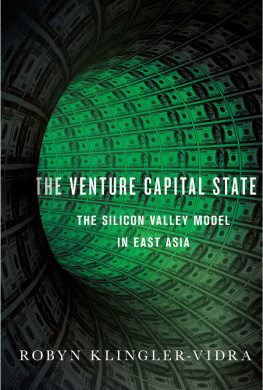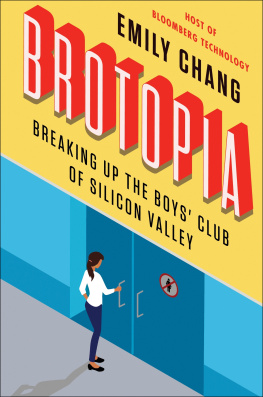
SECRETS
OF SILICON VALLEY
SECRETS
OF SILICON VALLEY
WHAT EVERYONE ELSE CAN LEARN FROM
THE INNOVATION CAPITAL OF THE WORLD
DEBORAH PERRY PISCIONE


SECRETS OF SILICON VALLEY Copyright Deborah Perry Piscione, 2013. All rights reserved. First published in 2013 by PALGRAVE MACMILLAN in the U.S.
a division of St. Martins Press LLC, 175 Fifth Avenue, New York, NY 10010. Where this book is distributed in the UK, Europe and the rest of the world, this is by Palgrave Macmillan, a division of Macmillan Publishers Limited, registered in England, company number 785998, of Houndmills, Basingstoke, Hampshire RG21 6XS. Palgrave Macmillan is the global academic imprint of the above companies and has companies and representatives throughout the world. Palgrave and Macmillan are registered trademarks in the United States, the United Kingdom, Europe and other countries. ISBN: 978-0-230-34211-8 Library of Congress Cataloging-in-Publication Data Piscione, Deborah Perry. Secrets of Silicon Valley : what everyone else can learn from the innovation capital of the world / Deborah Perry Piscione. p. cm. 1. Santa Clara Valley (Santa Clara County, Calif.)Economic conditions. 2. High technology industriesCaliforniaSanta Clara County. 3. Technological innovationsCaliforniaSanta Clara County. I. Title. HC107.C22S3957 2013 330.979474dc23 2012038481 A catalogue record of the book is available from the British Library. Design by Letra Libre, Inc. First edition: April 2013 10 9 8 7 6 5 4 3 2 1 Printed in the United States of America.
CONTENTS
PART I
AN EAST COASTER GOES WEST 1
PART II
SILICON VALLEY ECOSYSTEM AND CULTURE 45
11: The Lifestyle 167
Index 241
PART I
AN EAST COASTER GOES WEST

Los Altos Hills, California
A little over six years ago, my husband persuaded me to jettison our political lifestyle in Washington, DC, for California, the land of better weather.
I had spent nearly 18 years in the nations capital, and much of my identity was wrapped up in the city. On January 3, 1989, the first day of my Capitol Hill job, I sat in the fourth row of President George H.W. Bushs inauguration with my colleague, David Rivera, who later became a member of Congress, and a powerful donor from Florida. That weekend, I attended my very first inaugural ball and none other than then-Secretary of State James Baker walked up and shook my hand before meeting with U.S. Senator Connie Mack, for whom I worked, to congratulate him on his election victory. In the following weeks, icons like Robert Redford, Shirley Temple Black, and a handful of Fortune 500 executives visited our office to meet with the senator. I was lucky to meet them all. For someone just starting out their career, it was exhilarating.
As an undergraduate student I had spent a semester in London and became intrigued by the political dynamics of foreign policy, so when Rep. Ileana Ros-Lehtinen won a special election in the then-eighteenth congressional district of Florida and vied for a seat on the coveted House Foreign Affairs Committee, it didnt take much convincing for me to move over from the U.S. Senate to the U.S. House of Representatives. As a legislative assistant, I spent most of my time working on the Soviet Refusenik issue, putting pressure on President Mikhail Gorbachevs office to allow Russian Jews to emigrate out of the former Soviet Union. On any given day, I responded to constituent mail, and when given the opportunity, I poured myself into drafting Dear Colleague letters and op-eds, giving speeches, and traveling to Israel to meet with leaders about the housing loan guarantees that Congress had authorized for Israelall this by the age of 24. I had a deep passion for basic, fundamental human rights. Working on Capitol Hill, I quickly acquired knowledge about power, and how power leads to access. I obviously didnt care about money on my $17,000 salary, but I wanted direct access to decision makers, and I wanted my phone calls promptly returned.
I worked on Capitol Hill by day and attended graduate school at Georgetown University at night, specializing in international affairs and economics. I worked incredibly hard to try to get a Ph.D. in Economics, but I just couldnt afford to go to school full-time, which Georgetown required for doctoral students. After three years on Capitol Hill, I was asked by the White House to serve as a political appointee in the administration of President George H.W. Bush. By the time my security clearance came through, however, I had spent only nine months at the Department of State before President Bush lost his re-election. On January 20, 1993, the day of President Bill Clintons inauguration, I received my pink slip.
I took off to Brazil on an extended hiatus, and it was there I was able to put aside my type-A personality and immerse myself in the Brazilian culture. The colors, the freedom, and the food were memorable, but more notably, I learned about incredibly joyous people who often had nothingor the countless people I came across in cities of the state of Minas Gerais who often didnt know where their next meal was coming from. I saw them carry themselves with incredible grace and richness. I traveled to the Amazon, among my top three places I had always wanted to visit. On my first night, after trying to quell my own disbelief that I was actually sleeping outside in the Amazon, I was attacked by a troop of flying cockroaches. Later in the evening, an anaconda snake decided to pass through our open-air boat right next to me while I was sleeping. On my second night, a furious crocodile chased me, my traveling companion, and the Amazonian Indian we had hired to take us out there. This was an exhilarating experience, and I began to learn that I could be remarkably calm in adverse situations. I took my watch off in the Amazon and never put one on again. Brazil had taught me the meaning of life, and helped me to answer the question of what I wanted to do with the rest of mine.
In June of 1993, I inevitably returned to Washington. I looked for meaningful work, but in a down economy I reluctantly had to accept a job lobbying for many issues that I really didnt care about, such as financial derivatives.
A few years later during the Clinton administration, as the Monica Lewinsky scandal was starting to percolate, I was asked by the Republican National Committee to serve as a commentator on television, and days later I made my first appearance on MSNBC. Within weeks, I was espousing my opinions and debating some of the countrys most brilliant minds, including Harvard professor Alan Dershowitz, O. J. Simpson prosecutor Marcia Clark, and former Labor Secretary Robert Reich. I later provided political and foreign policy commentary for Wolf Blitzer on CNN, an opportunity that I enjoyed immensely. On Wolfs show you had to deeply understand the substance of the debate, and not concern yourself about what your hair looked like or the type of collared shirt you would wear on air. I co-wrote a bestselling book with Dr. Julianne Malveaux, Unfinished Business: A Democrat and a Republican Take on the 10 Most Important Issues Women Face. I swept into the media world, and for nearly a decade, I worked with producers, agents, managers, speaking coaches, and style consultants to mold myself into great television. At one point, Henry Champ, a television personality, described me as fit to be a war correspondent after we co-anchored the inauguration of President George W. Bush for the Canadian Broadcasting Corporation and stood in freezing rain that relentlessly blew horizontally for hours. There was no heater at our media booth (although there was supposed to be), yet I never complained. I was grateful for the historic opportunity, so there was no reason to complain. Little did he know that I considered his comment to reflect the thick skin I had grown from all the televised shouting matches I endured, and eventually I came to realize that ratings were driven less by substance than by the decibel of the screaming matches. Although I was being groomed for my own television show, I no longer found this type of discourse productive, so I walked away from it.
Next page





 SECRETS OF SILICON VALLEY Copyright Deborah Perry Piscione, 2013. All rights reserved. First published in 2013 by PALGRAVE MACMILLAN in the U.S.
SECRETS OF SILICON VALLEY Copyright Deborah Perry Piscione, 2013. All rights reserved. First published in 2013 by PALGRAVE MACMILLAN in the U.S.